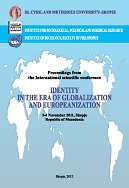TOWARDS A EUROPEAN IDENTITY: THE ROLE OF THE NATIONAL HISTORIOGRAFIES IN THE CREATION OF BALKAN MYTHS
TOWARDS A EUROPEAN IDENTITY: THE ROLE OF THE NATIONAL HISTORIOGRAFIES IN THE CREATION OF BALKAN MYTHS
Author(s): Jovan Ananiev, Strashko StojanovskiSubject(s): Social Sciences
Published by: Институт за социолошки и политичко-правни истражувања
Keywords: national historiography; national myths; nation- state; Balkans
Summary/Abstract: The rise of the nation and the promotion of national ideology have a key role in the redefinition of the Balkan identities. The new era of modernity is actually offering brand new standards for the definition of Otherness which is a precondition for the construction of the borders among the groups. During the imperial era, the communities were building the vision of the world through religious systems and their obeying as universal criteria. The new conditions of the market economy and citizenship offered the new national state as the only alternative, along with the nationalism, as an accompanying ideology. However, in order to homogenize the future national entities, it is necessary to create criteria for ethnicity that would be able to create a unique ethical awareness or expulsion on the basis of the so-called mutual collective memory, regardless of the territorial bases or the linguistic-cultural distinctions. Therefore, even during the 19th century the proto-national intelligence would accelerate, establishing the ethnical boundaries, pursuant the myth of the origin and the durability of the discrepancies. This would become an eternal task of the social engineering, as well as a task for the creators who shaped the framework of the Balkan historiographies. The challenges for the collective identity in the Balkans and the rest of Europe are approaching slowly, but surely. Simultaneously with the new mainstream of the political and economical integration of the Balkan countries into the European Union, the legal framework for the direct mutual communication and collaboration is being created. This threat is, at the same time, diffuse, uncertain and silent. It is not only an outcome of the external threats of the international terrorism which actually crystallize and strengthens the community as destined.
Journal: Proceedings from the International scientific conference
- Issue Year: 2012
- Issue No: 1
- Page Range: 177-187
- Page Count: 11
- Language: English
- Content File-PDF

